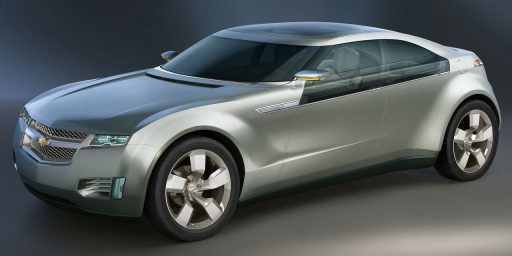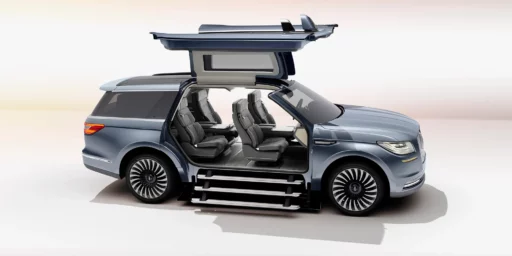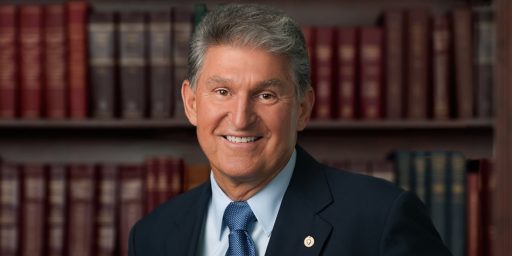Policies in Conflict
The Biden Administration wants clean energy but only for some.

Two stories featured at YahooNews highlight a pet peeve of mine.
Reuters (“U.S. senator Manchin says Treasury should limit commercial EV tax credit use“):
U.S. Senator Joe Manchin, a Democrat who chairs the chamber’s energy panel, asked the Treasury Department on Tuesday not to allow a commercial electric vehicle tax credit to be used for consumer leasing, rental cars or ridesharing vehicle sales, rejecting a broad interpretation of the credit.
Reuters first reported last week the push by South Korea and some automakers that asked the Treasury Department to allow use of the commercial electric vehicle tax credit to boost consumer EV access as well as for the purchase of ride share and rental car vehicles.
The $430 billion U.S. Inflation Reduction Act (IRA) passed in August ended $7,500 consumer tax credits for electric vehicles assembled outside North America, angering South Korea, the European Union, Japan and others.
The climate bill also imposes significant battery minerals and component sourcing restrictions, sets income and price caps for qualifying vehicles and seeks to phase out Chinese battery minerals or components. The commercial credit known as “45W” does not, however, have the sourcing restrictions of the consumer credit called “30D.”
“Some automakers and foreign governments are asking your agency for a broad interpretation of 45W that would allow rental cars, leased vehicles, and rideshare vehicles (such as those used for Uber and Lyft), a huge piece of the U.S. vehicle market, to be eligible for the full $7,500 commercial vehicle credit as a way to bypass the strict sourcing requirements,” Manchin, who chairs the Energy Committee and largely wrote the EV tax credit rules, said in a letter to the Treasury Department, which did not immediately comment.
Manchin said if successful in the interpretation “companies will focus their attention away from trying to invest in North America to meet the requirements of 30D and will instead continue with business as usual, putting our transportation sector further at risk.”
Manchin said he recognized “many of our allies may be upset at the strong domestic sourcing requirements included in the IRA and are looking for a way around them. Let me be clear, this bill was not designed to hurt any of our allied partners, but it was designed to help this country and make us stronger.”
NBC News (“Next year’s a good time to buy an EV. But for some, 2024 may be better.”):
Car buyers are watching the clock tick down for the Inflation Reduction Act’s updated electric vehicle tax incentives to kick in. The changes, which take effect next month, are likely to put EVs within closer reach for more consumers, experts say, but those with tighter budgets might benefit by holding off a bit longer.
“If you are ready to buy an EV that currently qualifies for the EV tax credit, jump on it,” said Jay Turner, an environmental studies professor at Wellesley College and author of “Charged: A History of Batteries and Lessons for a Clean Energy Future.” “Things get a lot more complicated next year.”
Among other provisions, the IRA includes limits on income and vehicle price that determine whether consumers get $7,500, $3,750 or $0 to put toward an electric vehicle. For example, a qualifying buyer’s modified adjusted gross income must not exceed $150,000 (or $300,000 for couples), and a new EV purchase must not exceed $80,000 for SUVs or $55,000 for sedans.
Thus far, said Tyson Jominy, vice president of data and analytics at J.D. Power, “the EV space has been dominated by a lot of wealthy consumers, very high-end vehicles. Part of the goal is to get down to middle-class levels.”
But the new law isn’t just trying to boost EVs’ appeal to get more drivers to go electric. It’s also trying to rev up the nation’s domestic EV production to boost made-in-USA inventories. As the legislation tries to balance both objectives by gradually phasing in multiple policies, the outlook can get confusing.
I’m not particularly interested, for the sake of this discussion at least, in either Manchin’s motivations here (which I’m sure are more complicated than advertised) or whether today is the right time to buy an EV (I’m skeptical). But, rather, in policy priorities in competition with one another.
Because he’s the President, these are Joe Biden’s policies. But he’s hardly unique here.
Regardless, he has put various policies in place to nudge American consumers toward greener energy, to combat climate change, lessen dependence on foreign sources, make the air cleaner, etc. In the main, I think they’re a good idea. While I have doubts about whether we can replace our petroleum-based vehicle fleet with electric ones to scale, we’ll never do it without the government helping facilitate the shift, particularly in establishing the charging infrastructure.
Yet, at the same time, the laws in question hamstring those goals by adding measures that are designed to achieve other goals.
Yesterday, I pointed to the administration’s frustrating continuance of his predecessor’s big move toward trade protectionism, usually under the feeble disguise of national security. In the specific cases of adversary nations—China, Russia, Iran, and North Korea, all of which have been called out in successive security and defense strategies—I tend to be in favor of this. But too often, including in this case, we’re hitting partners and allies as well. There’s simply no good justification for making it harder for South Korea, Japan, or Germany to sell Americans cars. Yet, here we are.
Similarly, while I get the optics of “tax breaks for the rich,” either we want to encourage folks to buy EVs or we don’t. If a couple making $300,000 a year—a handsome income, to be sure, but not exactly “rich” in some of our more expensive metro areas—wants to replace their 5-year-old luxury cars with newer, more fuel-efficient ones, why shouldn’t we encourage them to do so? They’re not making enough money that the $7500 subsidy—-which basically just offsets the extra up-front cost of the electric model versus the comparable gasoline-powered version—isn’t going to factor into the decision. So, in order to avoid criticism for subsidizing the well-off, we’re undermining our green energy efforts.
We’re doing the same thing in other areas as well. For example, the so-called Inflation Reduction Act provides subsidies for installing solar panels, replacing standard HVAC units with heat pumps, and other initiatives. But most if not all of them are graduated so they go away at relatively modest income levels. It’s simply self-defeating.






So if people like Manchin hold bills hostage in the senate and demand things like income phaseouts to “limit federal spending”, those then become Biden’s responsibility?
@Stormy Dragon: Yup. He’s the President and signed the bill; they’re his policies.
I think they are trying to thread too many needles. They are trying to increase manufacturing in the US while promoting green energy and trying to avoid the claims that EVs are only for the elites. (I think you now say elite instead of rich or well off since it lets you smear more people and the right kind of people.) My bet, especially with needing to win over Manchin and Sinema, they needed to address all 3 issues to get the bill passed.
Steve
Of course it’s Biden’s fault. Just like he’s destroyed Trump’s economy.
Meantime Manchin is writing legislation to limit the development of the recent fusion reaction because, coal.
If we had a functional democracy where Congress worked to deal with reality–climate change and getting America out of the 20th century auto-utopia–there would not be this frantic need to jam everything into one bill. Congress would be like–horror of horrors–a pleasant section of tenured academia than a bunch of salespeople in a barely-solvent office on the last day of the quarter trying to hit their quotas. But academia and funding and thinking and caring are tools of the elite devils, so here we are.
I’m inclined to agree with Manchin on the rental car fleet side of the issue, at least at first glance. It seems to me that the industry should invest in EV fleets because it makes financial sense, not because they get an incentive to do it. On ride sharing, I’m more agnostic. A company a few years ago that tried to use Teslas for taxicabs went banko after a couple of years (at least where I live). I suspect that even Chevy Bolts are too expensive for slave labor gig economy pool workers to buy without the incentives just like it is for most of the rest of us.
RATS!!! 🙁 I’d intended to have slave labor lined through as a deletion but used the wrong tag. Now my snark is lost! [sobbing emoji]